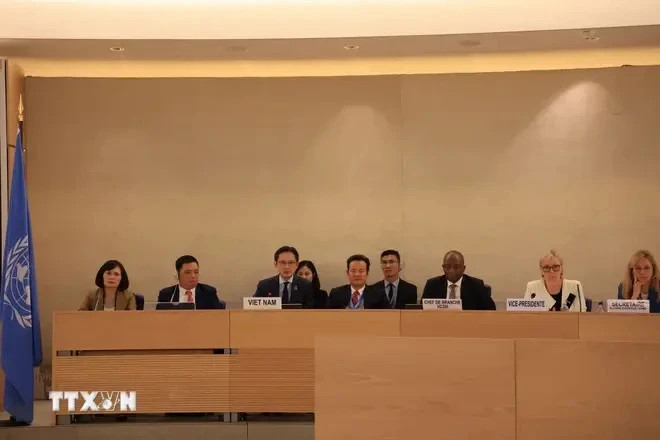In an interview on the UPR outcomes, Deputy Minister of Foreign Affairs Do Hung Viet attributed this remarkable achievement to meticulous preparations by the Vietnamese Government.
He said at the September 27 session, Vietnam announced its decision to accept 271 out of the 320 recommendations – the highest percentage across all the four UPR cycles. This, he said, underscored Vietnam's unwavering commitment to the UPR process and its dedication to protecting and promoting human rights.
The session was attended by representatives of around 90 countries, international organisations, and NGOs, with the vast majority of delegates lauding Vietnam's efforts and openness. The country provided updates on recent progress, particularly in legal reforms and socio-economic development, aimed at bolstering human rights.
The Vietnamese delegation promptly refuted wrongful allegations and unverified information presented by a minority of NGOs during the session, underlining the country’s ongoing work to create an enabling environment for citizens to actively engage in shaping legal policies.
According to him, a poignant moment came when countries expressed solidarity with and sympathies for the Vietnamese people following the recent devastating Typhoon Yagi. Many also praised Vietnam's engagement in the UPR dialogue at the UNHRC in Geneva in 2024, a year marking the 70th anniversary of the historic Dien Bien Phu victory and the signing of the Geneva Agreement on ending the war and restoring peace in Indochina.
Some speakers highlighted Vietnam’s long struggle for self-determination and its path toward independence, freedom, and happiness, seeing this as a foundation for the protection and promotion of human rights in the country today.
Countries welcomed Vietnam's acceptance of a large number of recommendations as reflecting its strong commitment to the UPR process and its broader efforts to protect and promote human rights.
They positively acknowledged Vietnam's achievements in propelling sustainable development to better ensure human rights, adopting a multidimensional approach to poverty reduction, advancing gender equality, and protecting vulnerable groups. Additionally, some nations spotlighted Vietnam’s valuable experience in effectively engaging with the UPR process and encouraged the country to continue sharing its best practices with others.

The comprehensive, objective, and reality-based assessments of Vietnam demonstrate the international community's positive interest and deep understanding of the country's people, history, culture, and development process, said Viet.
Looking ahead, the Ministry of Foreign Affairs will collaborate with relevant ministries and agencies to develop a comprehensive plan for implementing the accepted recommendations. This will include specific responsibilities, progress monitoring mechanisms, and a mid-term review.
Vietnam, the official stressed, will continue cooperating with the UN, international partners, and friendly countries to pool additional resources, ensuring optimal implementation of these recommendations./. VNA